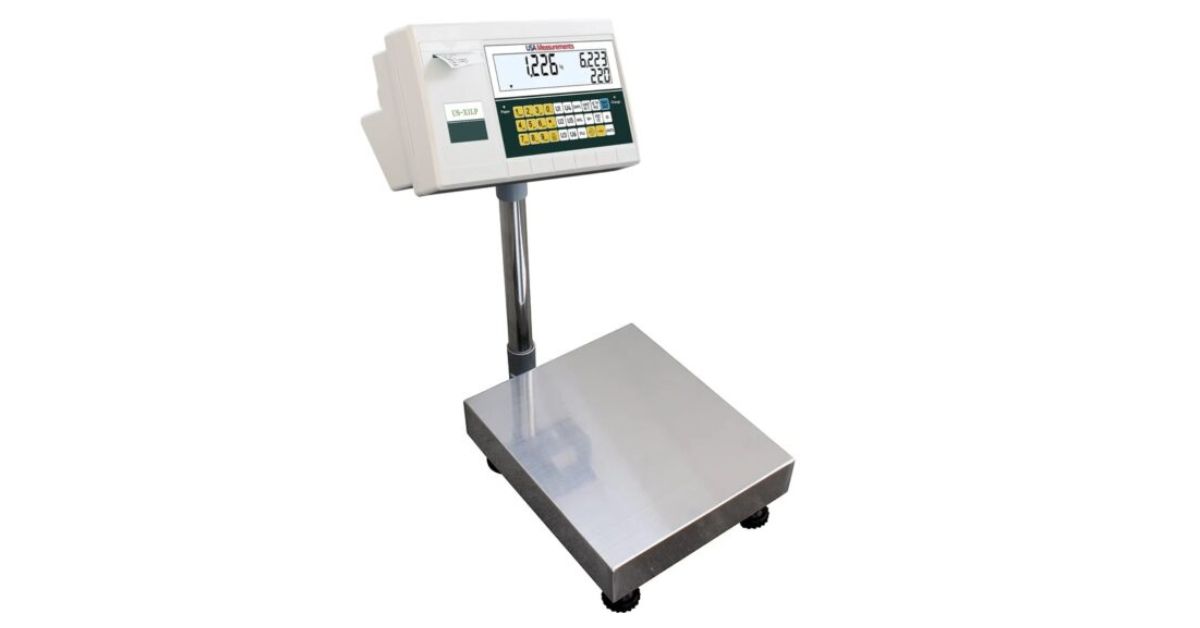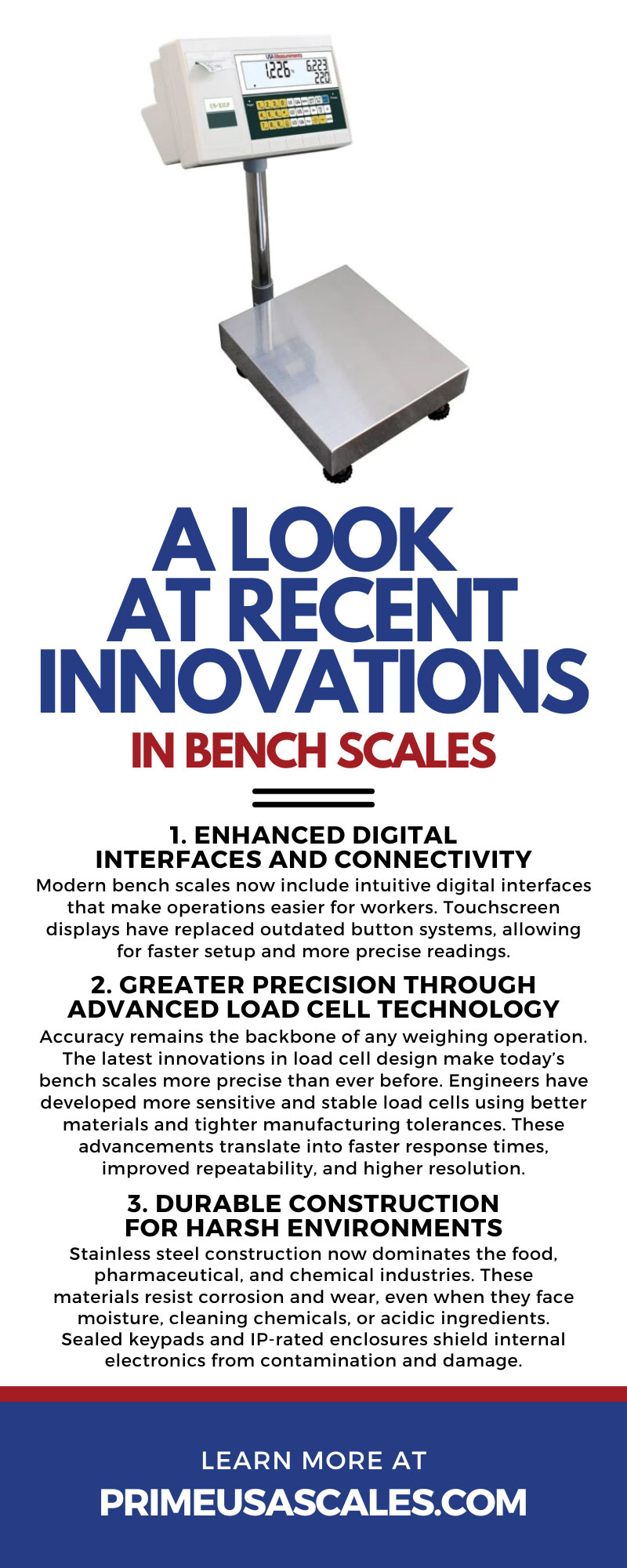Companies that use weighing equipment rely on precision, durability, and ease of use. Bench scales support a wide range of industries, including food processing, pharmaceuticals, manufacturing, and logistics.
Over the past few years, manufacturers have introduced major upgrades that change how bench scales perform during everyday operations. These improvements do more than look good on paper; they create measurable advantages. In this blog, we explore recent innovations in bench scales that deliver value to companies that need dependable and efficient weighing tools.
1. Enhanced Digital Interfaces and Connectivity
Modern bench scales now include intuitive digital interfaces that make operations easier for workers. Touchscreen displays have replaced outdated button systems, allowing for faster setup and more precise readings.
Many new models offer multi-language support, high-contrast screens, and simple menu navigation. These upgrades reduce training time and lower the chances of operator error.
Connectivity has also taken a major leap forward. Companies can now integrate bench scales with ERP systems, Bluetooth-enabled devices, and Wi-Fi networks.
This level of integration allows teams to log data automatically, eliminating manual entry and reducing the chance of mistakes. Operators can also transmit weighing results in real time to centralized databases, making compliance and reporting more efficient.
Some scales also offer USB ports and cloud-based data storage, which enable secure and instant access to historical records. These features help with audits, batch traceability, and quality control, especially in regulated industries. By making information more accessible, companies can stay compliant and make faster decisions based on accurate, up-to-date measurements.
These digital improvements help businesses work smarter, not harder. With enhanced interfaces and seamless data transfer, bench scales now support streamlined workflows from start to finish.
2. Greater Precision Through Advanced Load Cell Technology
Accuracy remains the backbone of any weighing operation. The latest innovations in load cell design make today’s bench scales more precise than ever before. Engineers have developed more sensitive and stable load cells using better materials and tighter manufacturing tolerances. These advancements translate into faster response times, improved repeatability, and higher resolution.
Many modern bench scales include digital load cells, which provide direct digital output instead of analog signals. This change reduces electrical noise and improves signal integrity.
The scale delivers a more reliable reading, even in environments with high electromagnetic interference. Labs, industrial facilities, and production floors depend on this reliability, accuracy, and dependability.
Temperature-compensated load cells now set the standard. These models maintain consistent results, even when temperatures fluctuate. They protect weighing accuracy from ambient conditions, a critical improvement for warehouses, kitchens, and chemical processing plants.
In addition to better internal components, manufacturers have improved calibration features. Automatic and semi-automatic calibration routines now keep scales accurate with minimal operator input. Some models even include internal calibration weights, reducing downtime and removing the need for frequent service calls.
3. Durable Construction for Harsh Environments
In industrial settings, bench scales must handle everything from water and dust to heavy shock and vibration. Recent innovations in design and materials have increased the durability of these scales, ensuring longer life spans and reduced maintenance costs.
Stainless steel construction now dominates the food, pharmaceutical, and chemical industries. These materials resist corrosion and wear, even when they face moisture, cleaning chemicals, or acidic ingredients. Sealed keypads and IP-rated enclosures shield internal electronics from contamination and damage.
Some manufacturers have gone a step further by introducing fully washdown-safe models. These units can endure high-pressure cleaning and meet strict hygiene standards. For businesses in regulated industries, these scales eliminate concerns about cross-contamination and help maintain compliance with safety protocols.
Manufacturers have upgraded shock-absorbing mounts and overload protection features. Modern scales now withstand impacts from dropped containers or equipment mishandling with greater resilience. These improvements minimize downtime and reduce repair needs throughout the scale’s lifespan.
“These advancements allow bench scales to handle demanding industrial environments without sacrificing performance. Their durable construction delivers long-lasting results and ensures your investment generates returns year after year.
4. Versatile Features for a Wide Range of Applications
Today’s bench scales offer more than just weight readings. Manufacturers have introduced smart features that support a wider range of operations and products. For example, some models include check weighing functions that alert operators when a product falls outside the weight limits, helping improve quality assurance on the production line.
Counting modes allow companies to calculate quantity based on the average weight of a single item. This calculation proves especially useful in packaging, inventory management, and order fulfillment. Scales with percentage weighing let businesses compare portions to a reference weight, supporting batching and recipe-based operations.
Some bench scales include barcode scanners, label printers, and programmable macros. These additions simplify complex processes and reduce the need for external equipment. As a result, operators can complete more tasks using a single device.
Manufacturers have also enhanced portability. Compact, battery-powered units now make it easier to bring the scale to the job instead of moving products to a fixed station. When weighing in a warehouse, field station, or temporary site, teams gain more flexibility and efficiency with portable designs.
These versatile features expand the role of bench scales beyond simple measurements. With multi-functional capabilities, they support efficiency gains across multiple departments.
5. Energy Efficiency and Sustainability Considerations
Companies across all industries now prioritize energy efficiency and sustainability. Bench scale manufacturers address these goals by designing products that reduce environmental impact without sacrificing performance.
Modern bench scales use low-power electronics that extend battery life and reduce energy consumption. Many scales now operate on rechargeable batteries that provide long run times between charges. This longer run time reduces waste from disposable batteries and lowers total ownership costs.
Manufacturers also prioritize recyclable materials and modular designs that simplify repair and reduce electronic waste. Instead of replacing an entire unit when something breaks, users can replace individual components, such as load cells, displays, or housing parts. This approach supports a circular economy and reduces landfill contributions.
Additionally, smart power-saving modes automatically shut off displays and sensors after periods of inactivity. This feature cuts down on unnecessary power use in busy environments.
By investing in energy-efficient bench scales, companies can meet their sustainability goals while maintaining productivity. These innovations support environmentally conscious operations without compromising durability or functionality.
Providing Real-World Benefits for Companies
Recent innovations in bench scales highlight a clear trend: manufacturers now build equipment that accurately measures weight and integrates seamlessly into modern workflows. From enhanced digital interfaces and advanced load cells to rugged construction and eco-friendly operation, today’s bench scales provide real-world benefits that companies can depend on.
Your operation can benefit now more than ever by upgrading to industrial table top scales or full-featured solutions designed for regulated environments. These advancements make a compelling case for businesses ready to improve their efficiency, reliability, and long-term value.

